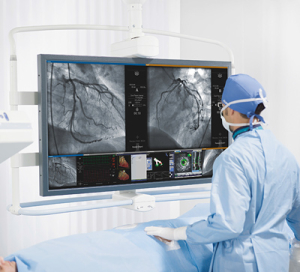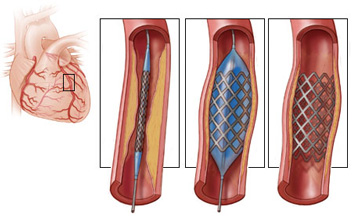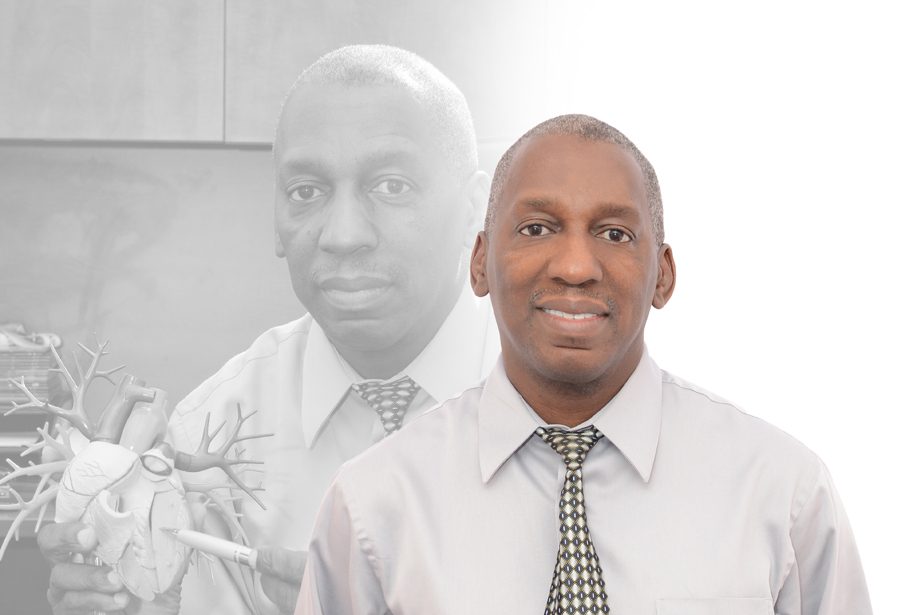Of the major health concerns facing the world today, cardiovascular health reigns supreme.
The World Health Organization (2008) reports a whopping 17.3 million deaths globally per year related to cardiovascular diseases, exceeding other major causes of death such as cancer, stroke, respiratory illnesses and HIV/AIDS. To overcome this growing global challenge to cardiovascular health, intervention is key.
Intervention is key“If you can’t treat a heart attack patient within a specified timeframe to reopen a blocked coronary artery, the damage to the heart could be irreversible,” says Dr. Clifford Thomas. “With a complex organ like the heart, timely intervention is critically important.”
During a heart attack, patients should therefore seek medical attention urgently by calling an ambulance or proceeding to the Hospital Emergency Room (ER).
Dr. Clifford Thomas is an Interventional Cardiologist and Director of Premier Heart Care, which he co-founded with his cardiology colleague Dr. Bruce Bird in 2012. Premier Heart Care, located in Woodbrook, Port of Spain, Trinidad and Tobago offers a range of diagnostic, preventative and interventional services.
Diagnostic Services
- Consultation: Patient interview and physical examination
- Electrocardiogram (ECG): Electrical tracing of the heart
- Echocardiogram: Ultrasound detection of structural and functional abnormalities of the heart
- Exercise Stress Test (Stress ECG) and Physiological Stress Echo (PSE): Recording of ECG and Echo during exercise to detect indicators of abnormal blood flow due to blocked arteries
- 24 hr ECG Holter Monitor: Detection of abnormal cardiac rhythms
- 24 hr ambulatory blood pressure monitoring: Records BP over a 24 hour period
- Cardiac CT: Provides detailed anatomical evaluation of the heart
- Cardiac Catheterization (coronary angiogram): Tiny catheters advanced into the heart (from blood vessels in the arm or leg) interrogate the cardiac chambers and coronary arteries.
- Stethoscope and ECG, Echo
From Engineering to Medicine
Looking back on a career of over 20 years in the field of cardiology, it is curious to note that medicine was not Dr. Thomas’ first passion.

“After completing high school, I wanted to be an engineer,” he says.
“At that time, part of my decision to switch from engineering to medicine was due to the opportunity to travel to Jamaica where the Faculty of Medicine of the University of the West Indies (UWI) was based — so there was that excitement of going to a new country. But after the first year of medical school, when I began working with patients in the clinic and wards, I knew that medicine was what I wanted to do.”
The heart is the engine of the bodyHe chose to specialise in internal medicine, i.e. non-surgical management of disorders of the brain, heart, lungs, kidneys and endocrine system; and later in cardiology, the sub-specialty of the heart.
“The heart is the engine of the body,” explains Dr. Thomas.
“If you look at it, you will see that the car’s engine resembles the human heart which is intelligent design and engineering at its finest. Notably, many years later when I met with a UWI Professor of Engineering, the Professor remarked that I was back in the field of engineering — only this time, creating bridges and tunnels to repair blocked arteries in the human heart.”
Interventional Cardiology
‘Interventional cardiology’ is the branch of cardiology that uses catheter-based techniques for the treatment of structural heart diseases, thereby avoiding open-heart surgery (the traditional method of repairing structural cardiac defects). Interventional cardiology procedures are performed in a specialised operating suite called a Cardiac Catheterization Laboratory (Cath Lab).

Angioplasty or PCI is the procedure that mechanically dilates narrowed or obstructed arteries, using a balloon-tipped catheter: the balloon is inflated by hydraulic pressure forcing the expansion and opening of the blood vessel leading to improved flow. A stent (a small mesh tube) is then used to ensure the vessel remains open after the balloon is deflated and withdrawn.
One of the pioneers that brought this procedure to the Caribbean regionAngioplasty is a key component of interventional cardiology, and is one of Dr. Thomas’ areas of expertise, having trained at the Royal Free Hospital, London and at Emory University, Atlanta, GA, where Andreas Gruentzig, the founding father of angioplasty, once practiced and perfected the technique.
Dr. Clifford Thomas was one of the pioneers that brought this procedure to the Caribbean region. He notes that the field has come a long way since its early days when patients often chose to leave the country to have such a procedure done abroad.
“This procedure requires skilled staff (cardiologists, nurses, radiographers) who operate with highly technical equipment in a Cath Lab in a hospital with adequate support facilities — all of which were not available two decades ago,” he adds.

Today, there are several Cath Labs and cardiac surgery operating suites throughout the country within both the private and public sectors, and there are plans underway for further development of the cardiology services of the Regional Health Authorities (RHAs) to add to the public services currently available to citizens.
It is a welcome development for Dr. Thomas, who has a keen interest in the accessibility of key health services for the general public.
Preventative Cardiology
Beyond the aspect of catheter-based scientific advances, there is another very important aspect of cardiology: preventative health care.
A family history does not necessarily predetermine fate“If as a country and as a region we do not intervene at an early stage and educate our populations about lifestyle changes and successful management of cardiac risk factors, the burden of heart disease will be much worse in a few years,” notes Dr. Thomas.
While genetic risk factors cannot be avoided, a family history does not necessarily predetermine fate.
Most risk factors for coronary artery disease are “modifiable” risk factors. These include:
- Obesity
- Diabetes
- High blood pressure
- High cholesterol
- Cigarette smoking
- Lack of exercise

Dr. Thomas advises that while exercise is essential for heart health, one should also be conscious of how the heart responds to exercise.
“Exertional chest pain can indicate a narrowed artery that can supply enough blood to the heart muscle when at rest, but struggles to supply increased flow necessary during exertion,” he explains.
“When you experience shortness of breath and tiredness during exercise or swelling of the legs, this can indicate heart failure, the inability of the weakened heart to pump blood efficiently to the extremities.”
If such symptoms are experienced, it is advisable to seek a doctor’s expertise. Ignoring these symptoms can lead to a myocardial infarction (commonly known as a heart attack) and irreversible heart failure.
At the heart of it
Dr. Thomas is humbled to have had a part to play in the development of cardiology services in the country and the wider region, not only through his own practice of medicine but also through his previous tenure as senior lecturer at UWI, with an intake of approximately 200 medical students each year.
“It is gratifying to see doctors whom I have taught, now serving as much needed medical practitioners; and to know that I have had a hand in that,” he says.
It makes you a better doctor“I also believe that academic medicine was crucial for my own career development. To be able to teach others you must know something thoroughly, so it spurs the inquisitive mind to keep learning, researching and seeking solutions. It makes you a better doctor.”

Dr. Thomas’ mettle as a doctor was tested many times throughout his career, but he remembers one particular incident in or around 2000. It happened the day after he had gotten into a vehicular accident that totalled his car but left him unharmed.
“It was the one day I said — I can’t operate today. I took a day off, but went to hospital that day just to clear up administrative papers on my desk,” he reminisces. “Then, a nurse grabbed my hand in the corridor and asked if I was on call. I explained that I wasn’t, but she insisted I come anyway.”
The patient was in the intensive care unit (ICU) and her blood pressure had fallen precipitously. He deduced that it was not heart failure but a collection of fluid called a “cardiac tamponade” that was compressing her heart. Acting quickly, he inserted a needle to withdraw the blood-stained fluid, and the patient immediately stabilised.
If you had gone yesterday, you wouldn’t be here today to save my life“When I returned to the bedside after making an entry in her medical record, the patient told me that she had heard about my accident the previous day,” he says. “I couldn’t fathom how someone in her recent critical state could be concerned about my own near-death experience. But she said: ‘If you had gone yesterday, you wouldn’t be here today to save my life.’ ”
It was a moment that reminded him just how precious life is, and the role that a healthcare professional plays.
He looks forward to expanding this role as he continues to build upon his cardiology practice at Premier Heart Care, developing partnerships with like-minded individuals and groups within both the private and public sectors, working towards a mission of accessible heart care for all.
His vision is to develop a model for the provision of state-of-the-art cardiovascular services in areas that are currently underserved, building a robust team that can circumvent the typical challenges encountered when establishing these services in the Caribbean and to replicate these efforts throughout the region.

